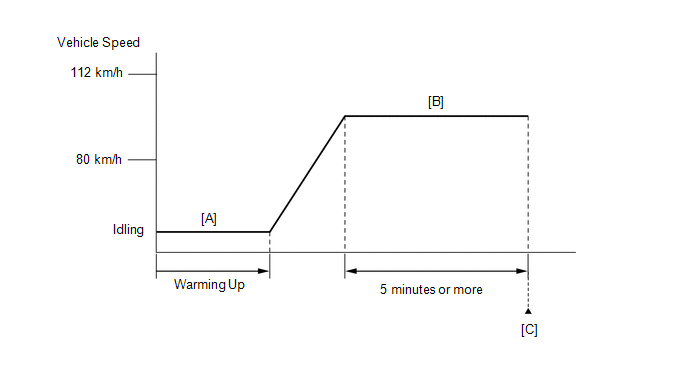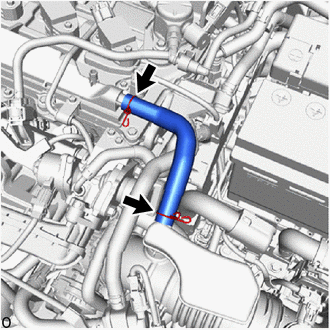Toyota Corolla Cross: Mass or Volume Air Flow Sensor "A" Signal Plausibility Failure (P010064)
DESCRIPTION
Refer to DTC P010012.
Click here
.gif)
|
DTC No. | Detection Item |
DTC Detection Condition | Trouble Area |
MIL | Note |
|---|---|---|---|---|---|
|
P010064 | Mass or Volume Air Flow Sensor "A" Signal Plausibility Failure |
All of the following conditions are met (2 trip detection logic).
|
| Comes on |
|
MONITOR DESCRIPTION
The mass air flow meter sub-assembly is a sensor that measures the amount of air flowing through the throttle valve. The ECM uses this information to determine fuel injection timing and to provide an appropriate air fuel ratio. Inside the mass air flow meter sub-assembly, there is a heated platinum wire which is exposed to the flow of intake air. By applying a specific electrical current to the wire, the ECM heats it to a specific temperature. The flow of incoming air cools both the wire and an internal thermistor, affecting their resistance. To maintain a constant current value, the ECM varies the voltage applied to the mass air flow meter sub-assembly. The voltage level is proportional to the airflow through the sensor, and the ECM uses it to calculate the intake air volume.
The ECM monitors the average engine load value ratio to check the mass air flow meter sub-assembly for malfunctions. The average engine load value ratio is obtained by comparing the average engine load calculated from the mass air flow meter sub-assembly output to the average engine load estimated from the driving conditions, such as the engine speed and the throttle opening angle. If the average engine load value ratio is below the threshold value, the ECM determines that the intake air volume is low, and if the average engine load value ratio is above the threshold value, the ECM determines that the intake air volume is high. If either of these conditions is detected in 2 consecutive driving cycles, the ECM illuminates the MIL and stores this DTC.
MONITOR STRATEGY
|
Related DTCs | P0101: Mass air flow meter rationality |
|
Required Sensors/Components (Main) | Mass air flow meter sub-assembly |
|
Required Sensors/Components (Related) |
Crankshaft position sensor Camshaft position sensor Engine coolant temperature sensor Throttle position sensor |
|
Frequency of Operation | Continuous |
|
Duration | 10 times |
|
MIL Operation | 2 driving cycles |
|
Sequence of Operation | None |
TYPICAL ENABLING CONDITIONS
|
All of the following conditions are met |
- |
| Throttle position voltage |
0.2 V or higher, and less than 2 V |
|
Time after engine start | 5 seconds or more |
|
Auxiliary battery voltage | 10.5 V or higher |
|
Engine coolant temperature | 70°C (158°F) or higher |
|
Estimated load | 30% or higher, and less than 70% |
|
Mass air flow meter circuit fail (P0102, P0103) (Pending + MIL) |
Not detected |
| Intake air temperature sensor circuit fail (P0112, P0113) (Pending + MIL) |
Not detected |
| Engine coolant temperature sensor circuit fail (P0117, P0118) (Pending + MIL) |
Not detected |
| Crankshaft position sensor circuit fail (P0335, P0337, P0338) (Pending + MIL) |
Not detected |
| Throttle position sensor circuit fail (P0121, P0122, P0123, P0222, P0223, P2135) (Pending + MIL) |
Not detected |
| Canister pressure sensor circuit fail (P0452, P0453) (Pending + MIL) |
Not detected |
| Leak detection pump fail (P2401, P2402) (Pending + MIL) |
Not detected |
| Evap system vent valve fail (P2419, P2420) (Pending + MIL) |
Not detected |
TYPICAL MALFUNCTION THRESHOLDS
|
Both of the following conditions are met |
- |
| Average engine load value ratio |
Less than 0.85, or higher than 1.2 (varies with estimated engine load) |
|
Average air fuel ratio | Less than -13%, or higher than 13% |
CONFIRMATION DRIVING PATTERN
HINT:
- After repair has been completed, clear the DTC and then check that the vehicle has returned to normal by performing the following All Readiness check procedure.
Click here
.gif)
.gif)
- When clearing the permanent DTCs, refer to the "CLEAR PERMANENT DTC" procedure.
Click here
.gif)
.gif)

- Connect the GTS to the DLC3.
- Turn the ignition switch to ON.
- Turn the GTS on.
- Clear the DTCs (even if no DTCs are stored, perform the clear DTC procedure).
- Turn the ignition switch off and wait for at least 30 seconds.
- Turn the ignition switch to ON.
- Turn the GTS on.
- Start the engine and warm it up until the engine coolant temperature is 70°C (158°F) or higher [A].
- Drive the vehicle at approximately 80 km/h (50 mph) to 112 km/h (70 mph) for 5 minutes or more [B].
CAUTION:
When performing the confirmation driving pattern, obey all speed limits and traffic laws.
HINT:
Drive while keeping the engine load as stable as possible.
- Enter the following menus: Powertrain / Engine / Trouble Codes [C].
- Read the pending DTCs.
HINT:
- If a pending DTC is output, the system is malfunctioning.
- If a pending DTC is not output, perform the following procedure.
- Enter the following menus: Powertrain / Engine / Utility / All Readiness.
- Input the DTC: P010064.
- Check the DTC judgment result.
GTS Display
Description
NORMAL
- DTC judgment completed
- System normal
ABNORMAL
- DTC judgment completed
- System abnormal
INCOMPLETE
- DTC judgment not completed
- Perform driving pattern after confirming DTC enabling conditions
HINT:
- If the judgment result is NORMAL, the system is normal.
- If the judgment result is ABNORMAL, the system is malfunctioning.
- If the judgment result is INCOMPLETE, perform steps [B] through [C] again.
- [A] to [C]: Normal judgment procedure.
The normal judgment procedure is used to complete DTC judgment and also used when clearing permanent DTCs.
- When clearing the permanent DTCs, do not disconnect the cable from the auxiliary battery terminal or attempt to clear the DTCs during this procedure, as doing so will clear the universal trip and normal judgment histories.
WIRING DIAGRAM
Refer to DTC P010012.
Click here
.gif)
CAUTION / NOTICE / HINT
HINT:
Read Freeze Frame Data using the GTS. The ECM records vehicle and driving condition information as Freeze Frame Data the moment a DTC is stored. When troubleshooting, Freeze Frame Data can help determine if the vehicle was moving or stationary, if the engine was warmed up or not, if the air fuel ratio was lean or rich, and other data from the time the malfunction occurred.
PROCEDURE
| 1. |
CHECK ANY OTHER DTCS OUTPUT (IN ADDITION TO DTC P010064) |
(a) Read the DTCs.
Powertrain > Engine > Trouble Codes|
Result | Proceed to |
|---|---|
|
DTC P010064 is output |
A |
| DTC P010064 and other DTCs are output |
B |
HINT:
If any DTCs other than P010064 are output, troubleshoot those DTCs first.
| B |
.gif) | GO TO DTC CHART |
|
| 2. |
CHECK INTAKE SYSTEM |
(a) Check the intake system for vacuum leaks.
Click here .gif)
OK:
No leaks from intake system.
HINT:
Perform "Inspection After Repair" after repairing or replacing the intake system.
Click here .gif)
| NG | .gif) | REPAIR OR REPLACE INTAKE SYSTEM |
|
| 3. |
CHECK PCV VALVE AND HOSE CONNECTIONS |

(a) Check the PCV hose connections.
(b) Check the PCV valve.
Click here .gif)
OK:
PCV hose and PCV valve are connected correctly and are not damaged.
| NG | .gif) | REPAIR OR REPLACE PCV VALVE OR HOSE |
|
| 4. |
PERFORM ACTIVE TEST USING GTS (CONTROL THE EGR STEP POSITION) |
(a) Connect the GTS to the DLC3.
(b) Start the engine and warm it up until the engine coolant temperature reaches 75°C (167°F) or higher.
HINT:
The A/C switch and all accessories should be off.
(c) Enter the following menus.
Powertrain > Engine > Active Test|
Active Test Display |
|---|
|
Control the EGR Step Position |
|
Data List Display |
|---|
|
Engine Speed |
|
Intake Manifold Absolute Pressure |
|
Coolant Temperature |
(d) Check the engine idling condition and Intake Manifold Absolute Pressure values in the Data List while performing the Active Test.
NOTICE:
- Do not leave the EGR valve open for 10 seconds or more during the Active Test.
- Be sure to return the EGR valve to step 0 when the Active Test is completed.
- Do not open the EGR valve 30 steps or more during the Active Test.
OK:
The value of Intake Manifold Absolute Pressure and Engine Speed change in response to EGR step position.
Standard:
|
- | EGR Step Position (Active Test) | |
|---|---|---|
|
0 Steps | 0 to 30 Steps | |
|
Idling condition | Steady idling |
Idling changes from steady to rough idling or engine stalls |
|
Intake Manifold Absolute Pressure (Data List) |
Intake Manifold Absolute Pressure value is 18 to 38 kPa(abs) (2.6 to 5.5 psi(abs)) (EGR valve is fully closed) |
Intake Manifold Absolute Pressure value is at least +10 kPa (1.45 psi) higher than when EGR valve is fully closed |
HINT:
During Active Test, if the idling condition does not change in response to EGR step position, then there is probably a malfunction in the EGR valve.
| OK | .gif) | GO TO STEP 6 |
|
| 5. |
INSPECT EGR VALVE ASSEMBLY |
(a) Remove the EGR valve assembly.
Click here .gif)
.gif)
(b) Check if the EGR valve is stuck open.
OK:
EGR valve is tightly closed.
HINT:
Perform "Inspection After Repair" after replacing the EGR valve assembly.
Click here .gif)
| NG | .gif) | REPLACE EGR VALVE ASSEMBLY
|
|
| 6. |
INSPECT MASS AIR FLOW METER SUB-ASSEMBLY |
Click here .gif)
|
| 7. |
CLEAR DTC |
(a) Clear the DTCs.
Powertrain > Engine > Clear DTCs(b) Turn the ignition switch off and wait for at least 30 seconds.
|
| 8. |
CONFIRM WHETHER MALFUNCTION HAS BEEN SUCCESSFULLY REPAIRED |
(a) Drive the vehicle in accordance with the driving pattern described in Confirmation Driving Pattern.
(b) Enter the following menus.
Powertrain > Engine > Utility|
Tester Display |
|---|
| All Readiness |
(c) Input the DTC: P010064.
(d) Check the DTC judgment result.
|
GTS Display | Description |
|---|---|
|
NORMAL |
|
| ABNORMAL |
|
| INCOMPLETE |
|
| NEXT | .gif) | END |

.gif)

